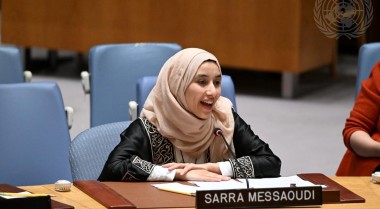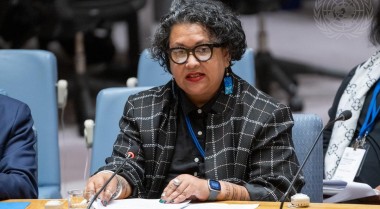
UN PBC Civil Society Statement: South-South and Triangular Cooperation for Building and Sustaining Peace
Check against delivery
Thank You, Chair.
Excellencies, Ladies and Gentlemen,
I would like to thank the Permanent Mission of Germany for organizing this important discussion and offering a chance for a member of South Sudanese civil society to address the Commission on this important topic.
At CEPO, we strongly believe that the effective use of South-South and Triangular Cooperation offer an unprecedented opportunity to support peace and stability in South Sudan.
One critical benefit of South-South and Triangular Cooperation is an opportunity to make actionable steps to shift the power in decision-making to national and local actors.
In the current peacebuilding debate, the international community shifts more towards localization. This means enabling countries and the people in the Global South to analyze and determine solutions based on learning ‘from within’ and from our brothers and sisters around the world. South-South and Triangular Cooperation does not only promote learning and exchange; it dictates that the decision must be vested in ourselves. Not the donors, not the UN resolutions, and not international partners. In us - national and local actors.
Commitment to localization is visible in today’s debate at the global level on national prevention and peacebuilding strategies. From the language of the Pact of the Future, it is clear that national prevention and peacebuilding strategies must be nationally- and locally-led. It is important that the global peacebuilding spaces are not only discussing such strategies, but also attempt to provide guidance and technical support to those willing to onboard on this journey. The Peacebuilding Commission could indeed provide a critical platform for the governments and their people to learn from each other and seek support from each other.
In the global debate, it is established that the political will to develop such a strategy has to come from within. Here comes a question: How do we expect political will to come from within if the discussions on national prevention strategies are held mostly at the global level? I - a person who does peacebuilding in South Sudan on an everyday basis - learned about the concept of national prevention and peacebuilding strategies from my colleague who attended the Second CSO-UN Dialogue in December of last year.
For such a strategy to emerge from within, one step to take is to hold relevant discussions at the national and regional levels, allowing capital experts and local peacebuilders to co-design and co-own the concept. Global networks, such as the Global Partnership for the Prevention of Armed Conflict (GPPAC) and International Civil Society Action Network (ICAN), could become resources for the Commission to bring these discussions at the field level, in partnership with the UN peacebuilding actors.
Another critical step to take to truly enable the shift of power is redefining how peacebuilding is funded. Support for local peacebuilding action could be strengthened by co-designing and co-creation of programming with local peacebuilders. My organization - CEPO - is a proud partner of many UN agencies, funds and programmes supporting peacebuilding work in South Sudan, including with the support of the Peacebuilding Fund. UNDP, IOM, FAO, UNWOMEN, UNESCO and others provide important support to peacebuilding processes in Sudan. This includes recent climate change and peace projects in the communities of Bor, Pibor and Malakal, which involved IOM, UNWOMEN and UNFAO. The development of the project was participatory among the partners, and it is encouraging ownership of sustainability. To date, many of the projects are designed with reasonable participation of the South Sudan actors. However, such avenues do not allow us to gain ownership of the project. As a result, when the project concludes, there is rarely a follow-up. National ownership would mean that programming supported by the PBF is a part of the national strategy towards peacebuilding. Currently, we simply do not have space for developing such a strategy because what we do is largely driven by the resources we have, and not always by what we need.
With that said, the most impactful examples of PBF support for us came from knowledge sharing and exchange. In 2023, in partnership with IOM, UNESCO and CEPO, facilitated youth exchange between youth of South Sudan and Rwanda. Learning from the experiences of young people who are going or went through similar experiences allows us to create new approaches for dialogue and mediation. This project results in strengthened peaceful co-existence within respective communities in both countries. We encourage the PBF to support more projects that aim at knowledge exchange and co-creation of innovative peacebuilding methodologies by local peacebuilders from diverse contexts. In this, more attention needs to be paid to the capacity of local communities to co-design their own projects, rather than continue to become implementers of projects already designed by UN entities receiving the grants.
South-South and Triangular Cooperation is also not a blanket solution to peacebuilding needs.
First, inclusion cannot be replaced. In the context of South Sudan, we experience a slow process of political transition. After many three years of conflict and loss of human lives, IGAD was able to mediate between five conflicting parties and support implementation of the Revitalized Agreement on the Resolution of the Conflict in the Republic of South Sudan (R-ARCSS). This is an important example of South-South Cooperation. One of the reasons for the slow implementation of the Revitalized Agreement is that some South Sudanese parties, including government claimed that they were not adequately included in the process of writing the content of the R-ARCSS. This made the Agreement witness a high level of deficit in trust and confidence among the leaders of the party’s signatories to the Revitalized Agreement. Therefore, SSTC as a concept should not replace inclusive processes, including with the participation of diverse communities with diverse expertise.
Second, reliance on a traditional conservative understanding of power should not have a place in South-South and Triangular Cooperation. In South Sudan, we often see that local peacebuilders are perceived to be less influential despite the fact that ‘inclusive national ownership’ and not simply ‘national ownership’ underpins the concept of sustaining peace. SSTC should support diverse local peacebuilders, including women and youth, as critical peacebuilding stakeholders.
South-South and Triangular Cooperation could offer tremendous opportunities for South Sudan.
This includes opportunities for learning and exchange in areas of transitional justice, judicial reform, constitution-making and elections as critical opportunities for regaining country stability and peace. Our experiences have a lot to offer to the world as well. For example, Community Peace Dialogues in South Sudan have empowered community members to hold accountable political elites who fueled deadly armed violence. Our Peace Through Livelihood approach helped communities in conflict to generate joint livelihoods and reach peace. Many of these projects were meaningfully supported by the UN Peacebuilding Architecture, including the PBF and the UN field presences.
In conclusion, I would like to summarize that in order for SSTC to effectively support inclusive national peacebuilding priorities, 1) national level inclusive processes need to be designed through the support of peacebuilding networks and UN field presences, 2) global spaces for learning and acquiring technical support need to be available, including through the Peacebuilding Commission, and 3) financing for peacebuilding models, including valuable PBF grants, should be more participatory to enable decision-making be vested within community actors.
I Thank You, Chair


